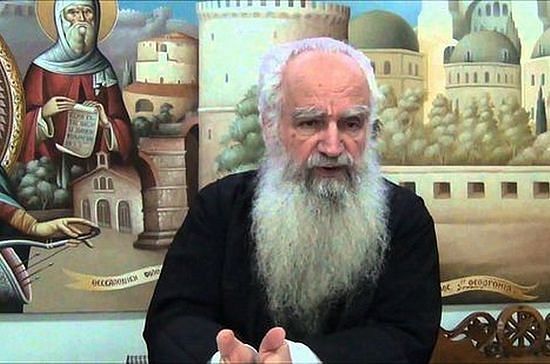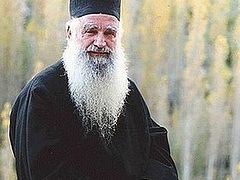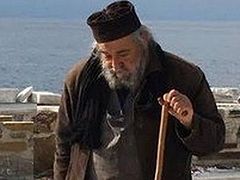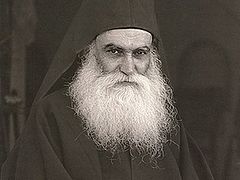Thessaloniki, December 22, 2017
The Synaxis of Greek Clergy and Monastics, a group dedicated to the fight against ecumenism, met on Tuesday in Thessaloniki in the hall of the Institute for Patristic Studies, reports Hodigitria.
On this occasion, Fr. Theodore Zisis, the president of the Institute and the chairman of the Synaxis’ organizing committee outlined the Synaxis’ activities over the past year.
Fr. Theodore is a respected priest and theologian who announced on the Sunday of Orthodoxy this year that he would cease commemorating his bishop, Metropolitan Anthimos of Thessaloniki, for the bishop’s support of the documents of the council held on Crete in the summer of 2016. Many hierarchs, clergy, monastics, and theologians have pointed to problems in the conciliar texts, including the use of the title “church” for non-Orthodox confessions, which appropriately applies only to the Orthodox Church in the strict, dogmatic sense of the word.
The practice of non-commemoration is based on Canon 15 of the First-Second Council of 861. For more information, read Fr. Theodore’s article “Defense and Declaration of Cessation of Commemoration of Bishop on Account of the Teaching of Heresy.”
The Synaxis is composed of both commemorating and non-commemorating clergy and monastics who are dedicated to the confession of the true faith in the fight against syncretistic ecumenism. Note that both Metropolitan Hierotheos (Vlachos) and the Sacred Community of Mt. Athos have spoken against the practice of non-commemoration in the present context.
During the session, a 2018 calendar was presented, highlighting great saints throughout history who have ceased commemoration at one time or another, in various contexts, and who emphasized the importance of the confession of the faith and the cutting off of heretical bishops, including St. Gregory the Theologian, St. Macarius, St. Nikita the Confessor, St. German of Constantinople, St. Sergius the Confessor, St. Nicephorus of Constantinople, St. Justin (Popovic), St. Paisios of the Holy Mountain, St. Nicodemos the Athonite, St. Maximus the Confessor, St. Gennadius Scholarios, St. Theodore the Studite, St. Gregory Palamas, St. Stephen the New, St. John of Damascus, and others.
The brochure “Cessation of Commemoration is Not Schism” by Fr. Theodore was also presented, which highlights that non-commemorators aim to disassociate themselves from heresy, not from the Church.
Fr. Theodore was welcomed by Metropolitan Seraphim of Piraeus for his courage in the confession of his faith and his love of Orthodoxy, and for his decision to cease commemorating Met. Anthimos, who had forbade Fr. Theodore to preach against the heresy of ecumenism and against the Council of Crete, which led to his decision to cease commemorating.
The Synaxis firmly rejected two extremes into which certain anti-ecumenistic brethren had fallen: The belief that non-commemoration of a ruling hierarch is automatically an act of schism on one extreme, and the belief that only those who cease commemoration make up the Church, while even those who rightly confess but continue to commemorate their hierarchs are heretics on the other extreme. The former was described by the Synaxis as reflecting a Papal attitude, while the latter stems from a serious lack of discernment and misplaced zeal.
The common denominator of both extremes is the diversion of the faithful from the Holy Chalice, and the preventing of concelebration between commemorating and non-commemorating clerics.
The Synaxis also highlighted that you can only legitimately cease commemoration of a bishop who publicly teaches heresy—it cannot be done on the basis of suspicion. Further, such a step should only be taken in consultation with one’s spiritual father, and with a great deal of patience and discernment.
The Synaxis also emphasized that the great modern fathers, in addition to the ancients, have spoken firmly against ecumenism, such as St. Paisios the Athonite, St. Seraphim (Sobolev), Archbishop Averky of Jordanville, St. Justin (Popovic), and others, in whose footsteps they seek to follow.





I'm just quite afraid, that this may happen also with Fr. Theodore, who has this charisma to mobilize people. For orthodox zealots the information that Fr. Theodore is excommunicated and controversial, is insignificant.
I agree that it's important to point out the problems in the conciliar texts, but not from a controversial voice..
Also Metropolitan Hierotheos Vlachos who had the courage to stand faithful to the Orthodox dogmas even when he was threatend by other Bishops at the so called Council at Crete . They should be hold in honor fot what they do .
Father Raphael Noica - Nothing was done on the line to sell Orthodoxy: https://youtu.be/NcjUXUVZnH0
https://www.youtube.com/watch?v=4WgAHwKrJRY